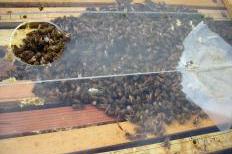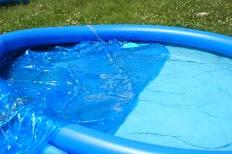







According to zoning administrator Matt Tucker, there are 39 beekeeping licenses out in Madison, and only about three or four have had complaints lodged against them since the ordinance passed in February 2012. This is comparable to complaints about Madison's urban chicken raisers, Tucker said.
He noted the issues that most commonly come up with beekeepers have to do with the personal responsibility of keepers, like hives resting closer to lot lines than the ordinance allows.
Loni Broesch has filed multiple complaints about her neighbor and says she's miserable living next to a beekeeper.
“We have bees everywhere,” she wrote in an email in March. “We find them attached to our screens on our house, we find them in our vehicles, we can even find them dead right now in the snow. It is nothing but a nuisance for us.”

But not everyone minds living close to neighborhood hives.
Lenny Williston’s experience has been very different from Broesch's. His neighbor, Tod Noltemeyer, kept beehives for the first time last summer. Noltemeyer warned Williston that the bees would be attracted to his birdbath, so Williston made sure it had water in it.
“I kind of liked them,” he said. “I’d get a lot of them over here every day… I’d go right up there and watch them.”
Williston said he was interested in the beekeeping process and found it to be a “learning experience.” Often working in his yard, he had plenty of opportunities to watch the insects and said he never had issues with the increased bee activity. He also never noticed any dead ones in the water.
Broesch said that part of the problem is the amount of hives beekeepers can have. The ordinance allows for up to six hives per lot, and each hive can be up to 20 cubic feet in volume.
Urban beekeepers don’t usually reach the maximums set in the ordinance, zoning administrator, Tucker said. The limits were established to account for fluctuations in beehives, which grow or shrink depending on the season and how well they’re doing overall.
The number of hives mostly relates to the practice of splitting them. Since beehives can die off over the winter, splitting one hive into two – with a new queen – increases the chance that one will survive, said Jeanne Hansen, the instructor of local beekeeping classes. Beekeepers can also split a hive that is doing particularly well.
While Tucker said he doesn’t want to dismiss Broesch’s concerns, he thinks the ordinance has been working well overall.
“We just have to make sure that [beekeepers] follow it as they should,” he said. “And if they don’t, we shoot them tickets.”
When the city receives a complaint, an inspector is sent out to assess the situation and make sure the beekeeper is in compliance with the ordinance. If the inspector finds any violations, the property owner has until a set date to correct it.
Most of the bee-related complaints aren’t “keepers,” Tucker said. The problem usually gets fixed and the complaint ends there.
“I think [urban beekeepers] do a fairly good job of sort of self-policing and doing best-practices,” Tucker said.
Editor's note: The caption has been changed to reflect the fact that the bees in the pool are not dead.
|
|
|
Welcome to the Madison Commons, a website designed to provide news and information about all of Madison's neighborhoods and a crossroads for the discussion of community issues. The name comes from the idea of a village commons, a place for news, talk, debate, and some entertainment, too, that's open to everyone.
All rights reserved. Read more about the Madison Commons and its partners.

